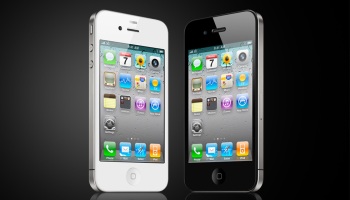

Amid worldwide delays in the release of Apple’s white-bodied iPhone 4, reports have emerged in the Chinese press that the company commissioned to create the white iPhone covers – Lens Technology – has been encountering manufacturing difficulties.
According to Chinese-language newspaper 21st Century Business Herald, the company is struggling to find the right balance between paint thickness and opacity, and has also been unable to produce a casing white enough to meet Apple’s standards.
The launch of the white-bodied iPhone 4 is currently billed for the end of July.
Sales of Apple’s iPhone 4 have been through the roof since the device went on sale on 24 June. According to the company’s own figures, more than 1.7 million iPhone 4 smartphones were sold in the three days following the launch.
However, Apple has been plagued with complaints over an antenna issue associated with the black version of the device. When users hold the iPhone 4 in the left hand with their palm covering the lower left part of the stainless steel band that houses some of its antennas, they can either lose signal altogether, or experience a much weaker signal strength.
Concerns that Apple would have to issue a recall or conduct a hardware fix for the iPhone 4 caused shares in the company to fall at one point last week from $257.33 (£168) to $246.89 (£161) – which equates to £6.5 billion being wiped off Apple’s value. However, in a hasty press conference, Apple dismissed recall concerns, offering free silicone cases – which insulate the phone’s antenna – to all users.
“We haven’t figured out a way around the laws of physics yet,” joked Apple CEO Steve Jobs at the conference.
Jobs confessed that sales have slowed since the problem was reported, with only three million phones sold in three weeks. However, he claimed that only 1.7 percent had been returned by customers, compared to a six percent return rate for the iPhone 3GS, which launched last year.
Earlier this year Apple faced controversy over another of its Chinese manufacturers – after it was reported that the living and working conditions of some of its Foxconn factory workers were tantamount to slave labour, and had led to a string of employee suicides. As well as Apple, Foxconn counts Dell, Nokia and Hewlett-Packard among its customers.
The Taiwanese company has since said it is considering closing its mainland Chinese operations – a move that could see 800,000 workers lose their jobs. Foxconn has also said it will no longer pay extra compensation to families of employees who kill themselves. It said it will ease condolence payments of 100,000 yuan (£10,000) and instead will only provide the officially stipulated amount of one tenth of that amount.
“It’s a difficult situation,” said Jobs at the time. “We’re trying to understand right now, before we go in and say we know the solution … I can tell you a few things that we know: Foxconn is not a sweatshop.”
Apple fined 150m euros over App Tracking Transparency feature that it says abuses Apple's market…
OpenAI to release customisable open-weight model in coming months as it faces pressure from open-source…
Samsung's Bespoke AI-powered fridge monitors food to create shopping lists, displays TikTok videos, locates misplaced…
Huawei sees 38 percent jump in consumer revenues as its smartphone comeback continues to gather…
In world-first, China approves commercial flights for EHang autonomous passenger drone, paving way for imminent…
Microsoft closes down IoT and AI lab it operated in Shanghai tech district in latest…